Seven powerful aromas can help you combat anxiety and improve your sleep tonight. Lavender, nature's calming elixir, reduces heart rate and blood pressure. Chamomile, an ancient sleep aid, increases glycine for relaxation. Vanilla's sweet scent promotes calm and releases feel-good chemicals. Jasmine gently lowers heart rate and increases GABA activity. Bergamot, a citrusy stress-reducer, lowers cortisol levels. Sandalwood grounds you with its woody aroma, reducing mental chatter. Ylang-ylang, a tropical sleep enhancer, slows your heart rate and improves mood. By incorporating these scents into your bedtime routine, you'll create a peaceful environment conducive to restful sleep. Discover how to harness these aromas' full potential for your best night's sleep yet.
Lavender: Nature's Calming Elixir
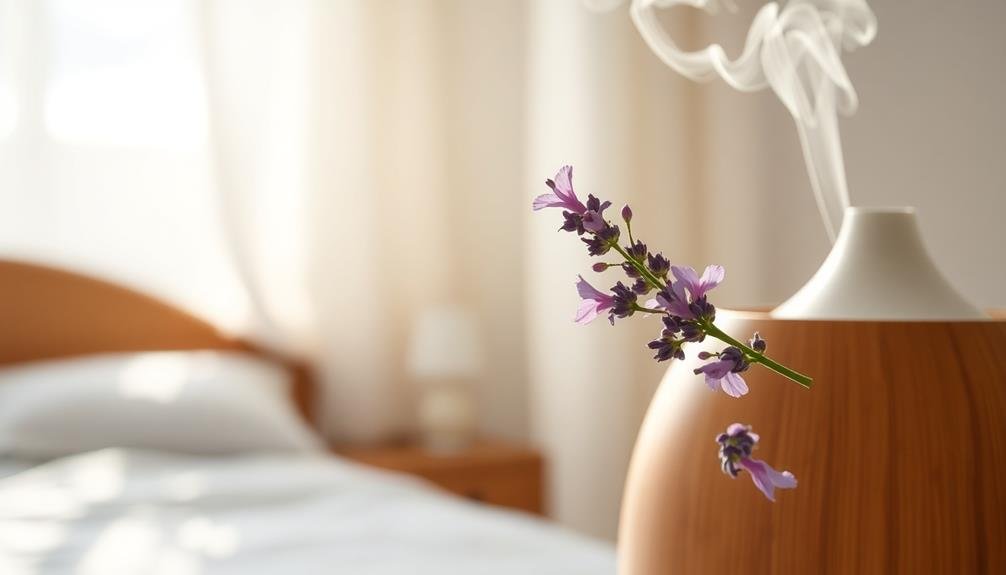
One of nature's most potent anxiety-busters, lavender has been used for centuries to promote relaxation and improve sleep quality. This versatile essential oil can be incorporated into your bedtime routine in various ways. You can add a few drops to your pillow, use a diffuser in your bedroom, or apply diluted lavender oil directly to your skin.
Lavender's calming effects are backed by science. Research shows that inhaling lavender scent can lower heart rate and blood pressure, putting your body in a more relaxed state.
It's also been found to increase slow-wave sleep, the deep sleep stage where your body recovers and repairs itself.
If you're new to using lavender for sleep, start with a small amount and gradually increase as needed. You can also combine lavender with other sleep-promoting practices, like taking a warm bath or practicing meditation before bed.
For maximum benefit, make lavender part of your nightly wind-down routine. Consistency is key in training your brain to associate the scent with sleep, enhancing its anxiety-reducing and sleep-inducing effects over time.
Chamomile: Ancient Sleep Aid
Chamomile's reputation as a sleep aid stretches back thousands of years, with ancient Egyptians, Greeks, and Romans all utilizing this gentle herb.
You'll find its calming properties have stood the test of time, as modern research continues to support its effectiveness in promoting relaxation and sleep.
Studies have shown that chamomile can increase glycine, a neurotransmitter that relaxes nerves and muscles, potentially explaining its ability to ease you into a restful slumber.
Historical Roots and Use
Antiquity's wisdom shines through in the enduring use of chamomile for sleep and relaxation. You'll find references to this gentle herb dating back to ancient Egypt, where it was revered as a gift from the sun god Ra. The Greeks and Romans also embraced chamomile, using it to treat various ailments and promote restful sleep.
Throughout medieval Europe, chamomile gained popularity as a mild sedative and digestive aid. Monks cultivated it in monastery gardens, recognizing its calming properties. By the 16th century, chamomile had become a staple in European herbal medicine, often prescribed for insomnia and anxiety.
In modern times, chamomile's reputation as a sleep aid has only grown stronger. You'll find it in countless bedtime teas, aromatherapy products, and herbal supplements. Scientific research has begun to support what traditional healers have long known: chamomile contains compounds that can help reduce anxiety and improve sleep quality.
Today, you can easily incorporate this time-tested remedy into your nightly routine. Whether you're sipping a cup of chamomile tea or using its essential oil in a diffuser, you're tapping into centuries of herbal wisdom to promote better sleep.
Modern Scientific Evidence
While ancient civilizations relied on observation and tradition, modern science has begun to unravel the mysteries behind chamomile's sleep-promoting effects. Research has identified apigenin, a flavonoid compound in chamomile, as a key player in its calming properties. This molecule binds to specific receptors in your brain, potentially reducing anxiety and initiating sleep.
Several studies have explored chamomile's impact on sleep quality. A 2011 study published in the European Neuropsychopharmacology journal found that participants who consumed chamomile extract experienced improved sleep quality compared to those who took a placebo.
Another study in 2017 showed that new mothers who drank chamomile tea for two weeks reported better sleep quality and fewer symptoms of depression.
While more research is needed to fully understand chamomile's mechanisms, existing evidence suggests it may help reduce sleep onset time and improve overall sleep quality.
It's crucial to recognize that individual responses can vary, and chamomile may interact with certain medications. Always consult your healthcare provider before incorporating new supplements into your routine, especially if you have existing health conditions or are pregnant.
Vanilla: Comforting Bedtime Scent
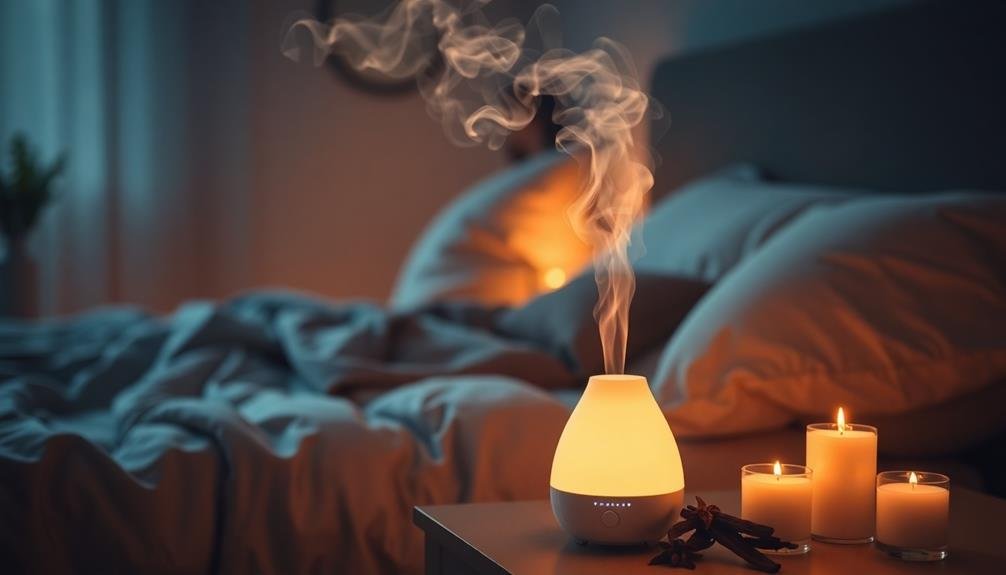
You'll find vanilla to be a sweet dreams inducer, thanks to its calming and comforting scent.
This fragrance boasts stress-reducing properties that can help ease your mind before bedtime.
You can incorporate vanilla into your nighttime routine through various aromatherapy applications, such as diffusers, scented candles, or even a few drops of vanilla essential oil on your pillow.
Sweet Dreams Inducer
The sweet, comforting aroma of vanilla can transform your bedroom into a tranquil oasis for sleep. This versatile scent has been shown to reduce stress and anxiety, making it an ideal choice for those struggling with restless nights.
When you inhale vanilla's soothing fragrance, your body releases feel-good chemicals that promote relaxation and calmness.
To harness vanilla's sleep-inducing powers, try incorporating it into your bedtime routine. You can use a vanilla-scented essential oil in a diffuser, spritz your pillow with a vanilla-infused linen spray, or light a vanilla-scented candle an hour before bed.
For a more subtle approach, place a few drops of vanilla extract on a tissue and tuck it under your pillow.
You'll find that vanilla's warm, inviting aroma helps quiet your racing thoughts and ease tension in your body. It's particularly effective when combined with other relaxation techniques, such as deep breathing or gentle stretching.
As you drift off to sleep surrounded by the comforting scent of vanilla, you'll likely experience a more restful and rejuvenating night's sleep, waking up refreshed and ready to face the day.
Stress-Reducing Fragrance Properties
Ever wonder why vanilla is such a popular scent for relaxation? This sweet, comforting aroma has been shown to have powerful stress-reducing properties that can help you unwind and prepare for a restful night's sleep.
Vanilla's calming effect on the nervous system is due to its complex chemical composition, which includes compounds like vanillin and other aromatic molecules that interact with your brain's receptors.
When you inhale the scent of vanilla, you're likely to experience:
- A decrease in heart rate and blood pressure
- Reduced muscle tension and physical stress
- Improved mood and feelings of contentment
- Enhanced mental clarity and focus
These effects make vanilla an excellent choice for your bedtime routine.
You can incorporate this soothing fragrance into your sleep environment by using vanilla-scented candles, essential oils, or even placing a few drops of vanilla extract on your pillowcase.
The gentle, warm aroma will help create a tranquil atmosphere, signaling to your body and mind that it's time to relax and prepare for sleep.
Versatile Aromatherapy Applications
Vanilla's versatility shines through in its numerous aromatherapy applications, making it an ideal scent for your bedtime routine. You can incorporate this comforting aroma into your nightly ritual in various ways.
Try adding a few drops of pure vanilla essential oil to your diffuser, creating a soothing atmosphere throughout your bedroom. Alternatively, mix vanilla oil with a carrier oil like jojoba or coconut and apply it to your pulse points for a personal, long-lasting scent experience.
For a more immersive approach, add vanilla-scented bath salts or bubble bath to your evening soak. This will help you relax and prepare for sleep while enveloping you in the calming fragrance.
You can also spritz a vanilla-infused linen spray on your pillows and sheets before bed, ensuring the aroma surrounds you as you drift off to sleep.
Don't forget about scented candles or wax melts, which offer a gentle, ambient light along with the comforting vanilla scent. For a subtle option, place a vanilla-scented sachet in your pillowcase or nightstand drawer.
These versatile applications allow you to tailor your vanilla aromatherapy experience to your preferences and needs.
Jasmine: Gentle Floral Relaxant
Among floral scents, jasmine stands out as a gentle yet effective relaxant for those struggling with anxiety and sleep issues. Its sweet, exotic aroma has been used for centuries to promote calmness and induce restful sleep. When you're feeling overwhelmed or having trouble winding down at night, jasmine essential oil can be your go-to solution.
To incorporate jasmine into your bedtime routine, try these methods:
- Add a few drops to your diffuser 30 minutes before bed
- Mix with a carrier oil and apply to your pulse points
- Sprinkle diluted jasmine oil on your pillowcase
- Use jasmine-scented bath products for a relaxing soak
Jasmine's calming effects are backed by science. Studies have shown that inhaling jasmine fragrance can lower heart rate and blood pressure, leading to a more relaxed state.
It's also been found to increase GABA activity in the brain, which helps regulate mood and promote sleep. Unlike some stronger scents, jasmine's delicate aroma won't overwhelm your senses, making it ideal for nighttime use.
You'll find yourself drifting off to sleep more easily and waking up feeling refreshed.
Bergamot: Citrusy Stress Reducer
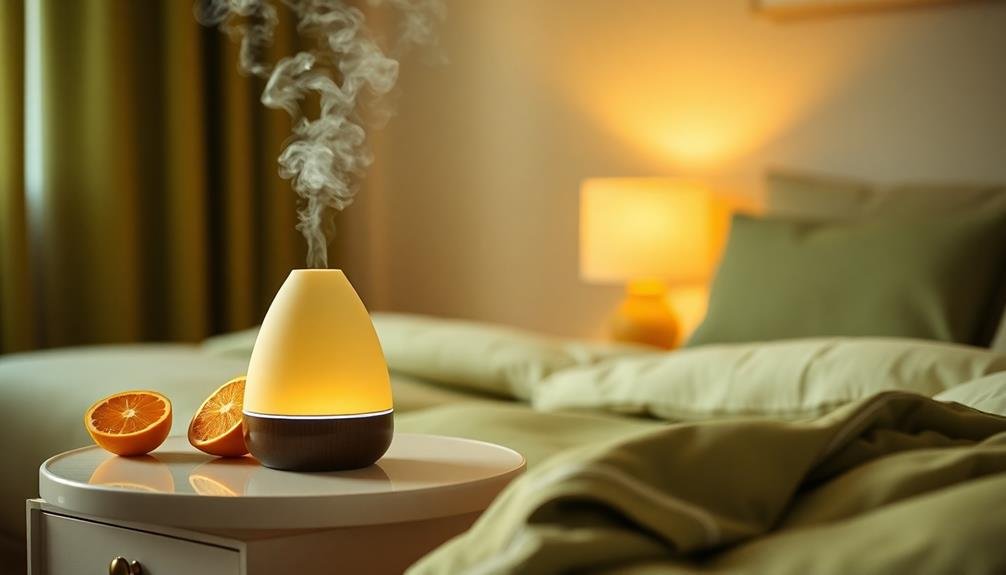
Balancing citrusy brightness with calming properties, bergamot offers a unique approach to stress reduction and better sleep. This essential oil, derived from the bergamot orange, has been shown to lower cortisol levels and reduce anxiety. Its invigorating scent can lift your mood while simultaneously promoting relaxation.
To incorporate bergamot into your bedtime routine, try diffusing it in your bedroom or adding a few drops to your pillow. You can also create a calming massage oil by mixing bergamot with a carrier oil like jojoba or sweet almond. For an extra boost of relaxation, combine bergamot with lavender or chamomile.
| Method | Benefits | Usage |
|---|---|---|
| Diffusion | Ambient relaxation | 5-7 drops in diffuser |
| Topical | Direct stress relief | 2-3 drops in carrier oil |
| Bath | Full-body relaxation | 4-5 drops in bath water |
While bergamot is generally safe, it can increase photosensitivity. Avoid direct sunlight after applying it to your skin. If you're pregnant or have sensitive skin, consult a healthcare professional before use. With its uplifting yet calming properties, bergamot can be a valuable addition to your anxiety-busting, sleep-promoting arsenal.
Sandalwood: Grounding Woody Aroma
Sandalwood's rich, woody aroma offers a different approach to anxiety reduction and sleep improvement. This ancient essential oil has been used for centuries in meditation practices and traditional medicine. Its deep, earthy scent helps to calm the mind and promote relaxation, making it an excellent choice for those struggling with anxiety-induced insomnia.
When you use sandalwood essential oil before bedtime, you'll likely experience:
- A sense of grounding and stability
- Reduced mental chatter and racing thoughts
- Improved ability to let go of daily stressors
- Enhanced overall relaxation and readiness for sleep
To incorporate sandalwood into your nighttime routine, try adding a few drops to a diffuser in your bedroom or mixing it with a carrier oil for a soothing massage. You can also place a drop on your pillow or add it to a warm bath before bed.
The oil's long-lasting scent will continue to work its magic throughout the night, helping you maintain a deeper, more restful sleep. Remember, consistency is key when using aromatherapy for anxiety and sleep issues, so make sandalwood a regular part of your evening ritual.
Ylang-Ylang: Tropical Sleep Enhancer
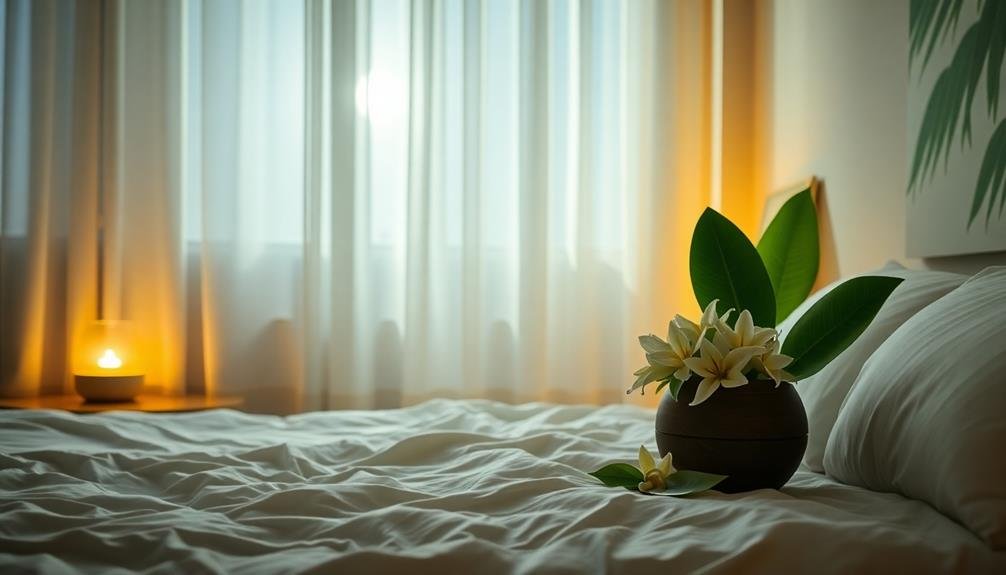
The sweet, floral scent of ylang-ylang essential oil offers a tropical twist to your anxiety-busting sleep routine. This exotic aroma, derived from the star-shaped flowers of the Cananga tree, has been used for centuries to promote relaxation and reduce stress.
Ylang-ylang's powerful calming properties can help you unwind after a long day and prepare your mind and body for restful sleep. It's known to lower blood pressure, slow heart rate, and decrease cortisol levels, all of which contribute to a more peaceful night's rest.
| Benefits | How to Use |
|---|---|
| Reduces anxiety | Diffuser |
| Lowers blood pressure | Pillow spray |
| Improves mood | Bath oil |
To incorporate ylang-ylang into your bedtime routine, add a few drops to your diffuser or mix it with a carrier oil for a soothing massage. You can also create a relaxing pillow spray by combining ylang-ylang with water in a small bottle. Spritz your pillowcase before bed to surround yourself with its calming scent throughout the night.
Frequently Asked Questions
Can Essential Oils Be Harmful if Used Incorrectly for Sleep?
Yes, essential oils can be harmful if used incorrectly for sleep. You shouldn't ingest them or apply undiluted oils to your skin. They can cause allergic reactions, irritation, or interact with medications. Always follow proper safety guidelines.
How Long Does It Take for Aromatherapy to Improve Sleep Quality?
You'll typically notice improvements in your sleep quality within a few days to a couple of weeks of using aromatherapy. However, it's important to be consistent and use the oils correctly for the best results. Everyone's response may vary.
Are There Any Scents to Avoid Before Bedtime?
You'll want to avoid stimulating scents before bed. Steer clear of citrus, peppermint, and eucalyptus, as they can energize you. Instead, opt for calming aromas like lavender, chamomile, or vanilla to promote relaxation and better sleep.
Can Aromatherapy Help With Sleep-Related Anxiety Disorders?
Yes, aromatherapy can help with sleep-related anxiety disorders. You'll find that certain scents like lavender, chamomile, and bergamot can calm your mind and reduce anxiety. Try diffusing these oils or using them in a bedtime routine.
What's the Best Method to Diffuse Sleep-Promoting Scents in the Bedroom?
You'll find several effective methods to diffuse sleep-promoting scents. Try an electric diffuser, reed diffusers, or essential oil sprays. You can also use scented candles or place a few drops on your pillow. Choose what's most comfortable for you.
In Summary
You've now discovered seven powerful aromas to help you unwind and drift off to sleep. Whether you prefer floral, woody, or citrusy scents, there's an option for everyone. Try incorporating these fragrances into your bedtime routine through essential oils, candles, or pillow sprays. Remember, what works best may vary from person to person, so don't be afraid to experiment. Sweet dreams await as you harness the power of these natural sleep-inducing scents.


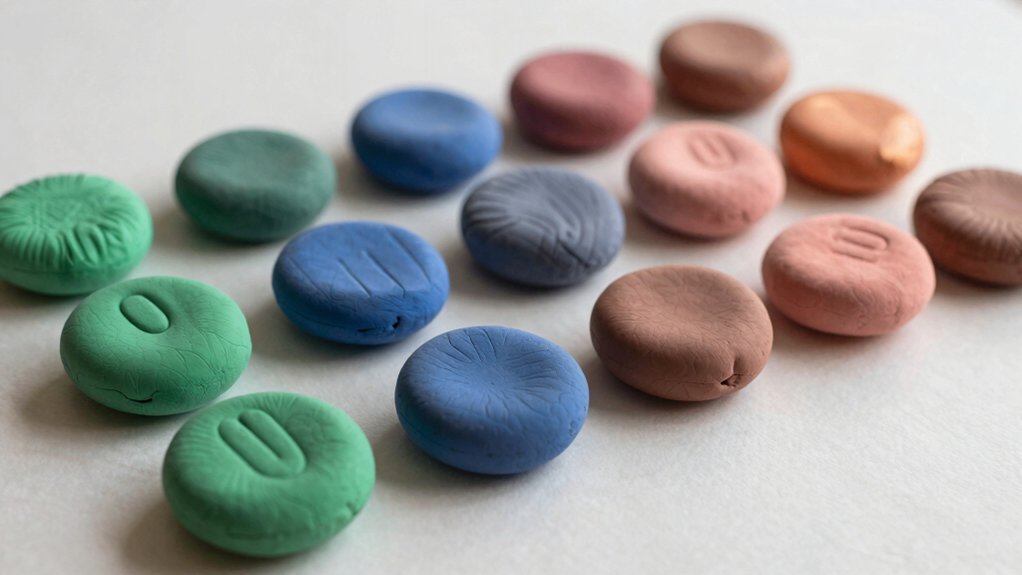

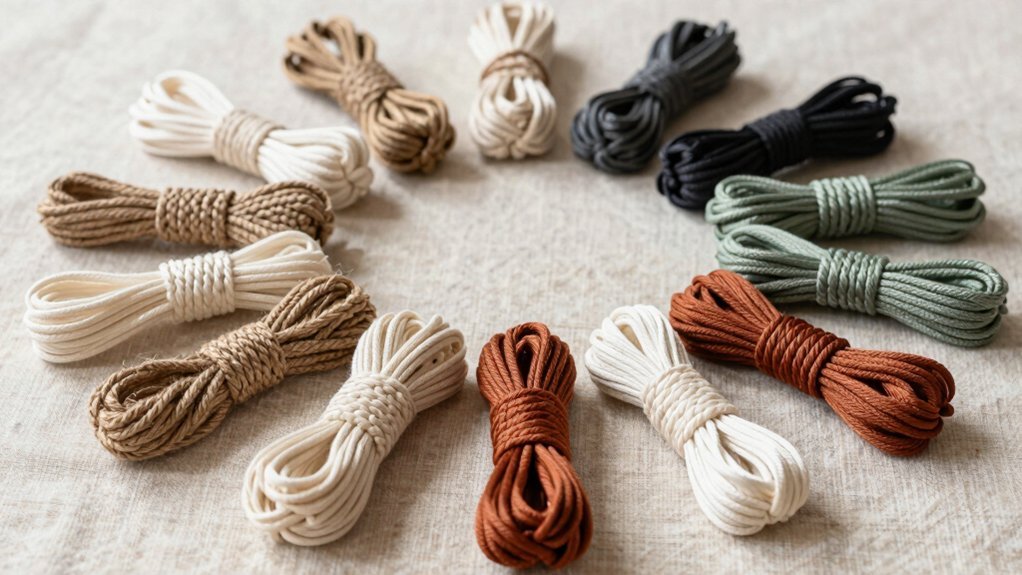
Leave a Reply